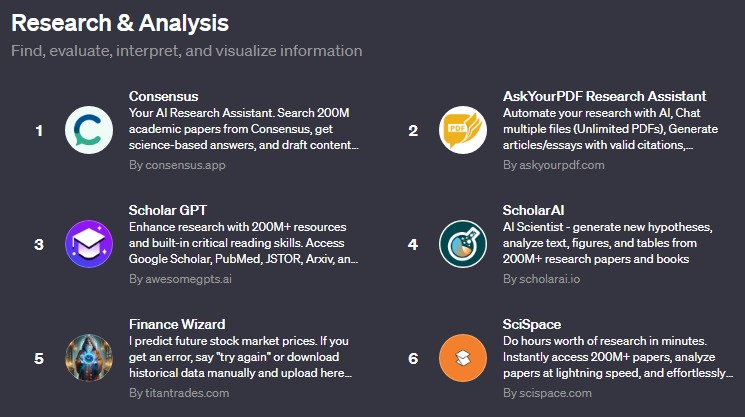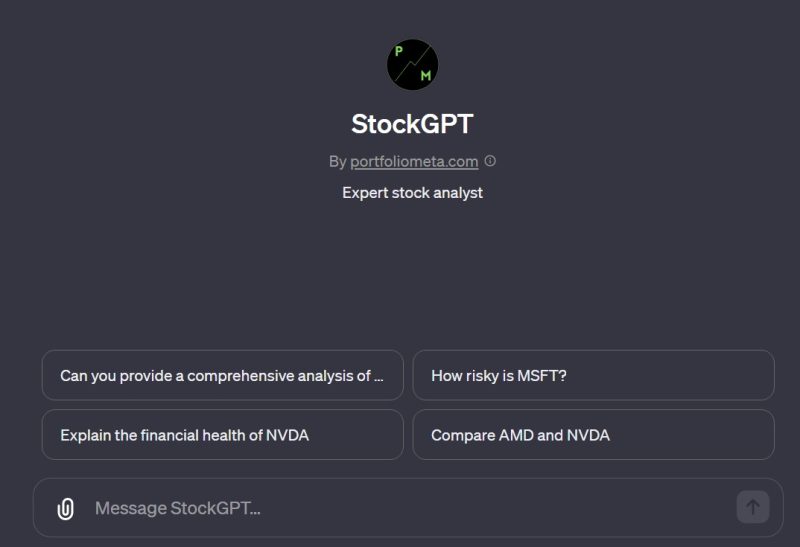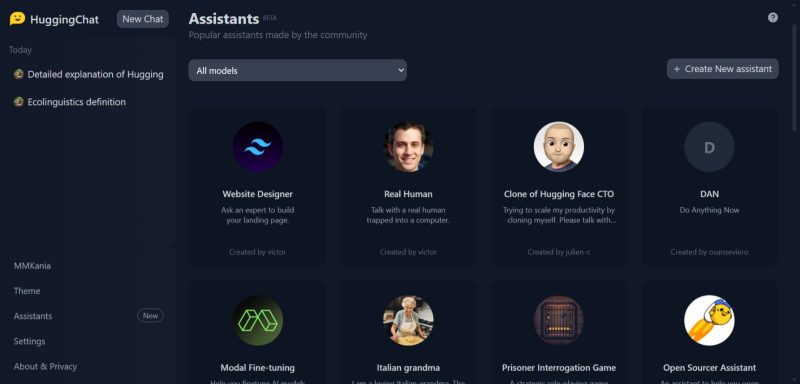GPT Store - table of contents
What is the GPT Store?
The GPT Store is an innovative platform launched by OpenAI, which enables users to discover, explore, and utilize customized versions of ChatGPT. It is a response to the growing demand for advanced AI tools in business. The platform was announced during OpenAI’s October conference.
Since its official launch in January 2024, it has been available to users of paid versions of ChatGPT Plus, Team, and Enterprise. Users can browse popular and trending GPTs in categories such as:
- DALL·E – so, the tools in the GPT Store for creating images,
- writing – meaning targeted solutions for developing various types of texts,
- research – here we’ll find GPTs analyzing data and trends,
- software – tools for programmers, as well as learning programming tools,
- education – various GPTs used for acquiring and consolidating knowledge,
- lifestyle – in this section of the GPT Store, you will find popular tools, from recipes through fashion to interior design.
For Team customers, there’s an option to create a private section with GPTs tailored to the company’s needs. For example, a creative agency can use the GPT Store to find AI tools that help create unique graphic projects, saving time and resources. But first, let’s look at GPTs related to the financial aspects of business operations.

Source: GPT Store (https://chat.openai.com/gpts)
StockGPT
StockGPT (https://chat.openai.com/g/g-0v9iaOSnO-stockgpt) is a tool dedicated to analyzing and providing insights into the stock market, delivering real-time stock market data analysis for companies listed in the USA.
It allows for assessing the financial condition of companies by analyzing their financial statements, gathers and interprets the latest market trends and news, takes risk analysis into account when assessing stocks, and identifies potential investment opportunities by analyzing stock valuations and growth prospects.
Additionally, StockGPT generates visual content such as charts and infographics using DALL·E and provides educational insights to educate users about the stock market and investment strategies.
It will certainly be useful for financial analysts, who, thanks to StockGPT, can quickly prepare reports for their clients using advanced data analysis and visualizations. It will also be useful for companies that do not employ such a specialist but need analysis of data collected from various sources.

Source: GPT Store (https://chat.openai.com/g/g-0v9iaOSnO-stockgpt)
CEO GPT
CEO GPT (https://chat.openai.com/g/g-EvV57BRZ0-ceo-gpt) is a tool that functions as a virtual mentor for startup CEOs, providing insights from the experiences of business icons. It offers advice on:
- company culture,
- product management,
- technology,
- marketing,
- strategy, and sales.
Its knowledge base includes shareholder letters from Amazon by Jeff Bezos and from Berkshire Hathaway by Warren Buffett. It provides concise and effective advice with the option to expand on demand, using tools such as DALL·E to generate images and a browser to retrieve information in real time, basing knowledge on the documents provided to ensure sound advice.
In practice, a young CEO can use CEO GPT to develop a growth strategy, drawing inspiration from Amazon’s shareholder letters, which allows decision-making based on the experiences of one of the world’s most successful entrepreneurs.
Market Analyst
Market Analyst (https://chat.openai.com/g/g-ZsNPcZHkH-market-analyst) is a tool specializing in stock, ETF, and comprehensive market analysis. It explains and identifies patterns and trends in technical analysis, interprets candlestick patterns and their market implications, discusses risk management techniques in trading, provides market research and analysis from reputable financial sources, offers educational content on market analysis techniques, discusses general investment strategies based on market analysis, and provides guides on fundamental analysis of a company’s financial condition and market position.
For example, a brokerage firm can use Market Analyst to provide clients with clear and detailed market analyses, enabling them to make informed investment choices.
Marketer GPT Pro
Marketer GPT Pro (https://chat.openai.com/g/g-6Je1erOAt-marketer-gpt-pro) is a tool specialized for a wide range of marketing strategy needs. It develops strategic and brand-specific marketing activities. It also helps with:
- brand analysis and development,
- identification and profiling of the target audience,
- competitive analysis, and
- finding opportunities to differentiate from competitors.
Marketer GPT Pro also helps in setting clear, measurable marketing goals, advises on budget planning and allocation of funds for marketing activities, develops comprehensive digital marketing strategies, offers guidance on content creation and management, devises plans and strategies for social media marketing, explains the use of analytical tools for tracking marketing results, advises on promotion and discount strategies, leads in building a product-based growth strategy, assists in creating a detailed marketing plan, provides insights into the use of AI tools in marketing, helps create a unique brand personality and voice, and explains how to utilize analytical tools in marketing.
For example, a marketing agency can use Marketer GPT Pro to create personalized campaigns that resonate with their unique target audience, resulting in increased engagement and better sales results.

Source: GPT Store (https://chat.openai.com/g/g-6Je1erOAt-marketer-gpt-pro)
GPT Finder
GPT Finder (https://chat.openai.com/g/g-P6MdNuLzH-gpt-finder) is a tool specializing in identifying and calculating the best GPTs for various purposes. It analyzes user requests and compiles a list of GPTs that meet specific criteria, provides recommendations with descriptions focused on individual goals, ensuring that responses are factual and based on document information.
For example, a technology company can use GPT Finder to find an AI tool that helps automate internal processes, significantly increasing efficiency and reducing operational costs.
GPT Store – summary
The GPT Store is a platform that transforms the business ecosystem by providing access to AI tools that support entrepreneurs in various aspects of their operations, also enabling the creation of custom GPTs. With over 3 million custom versions of ChatGPT created by users, the GPT Store showcases GPTs developed by partners and the community.
Creators can share their GPTs in the store, saving their GPTs for everyone and verifying their creator profile, which could soon turn into a business opportunity – creating paid GPTs similar to apps in the App Store or Google Play.
In the GPT Store, a review system has been introduced to ensure that GPTs adhere to security policies. Users can also report GPTs that are not functioning as they should. The GPT developer program is set to launch in the first quarter of 2024.
The main drawback of the GPT Store, however, is the paid access. But are there alternatives to the GPT Store? Yes. The free HuggingChat (https://huggingface.co/chat/) also uses AI to create chatbots that simulate human conversation. Here, too, you can now use assistants and create them yourself.

Source: Hugging Chat (https://huggingface.co/chat/assistants)
For entrepreneurs who want to stay up-to-date with the latest trends and leverage the opportunities offered by AI, tracking the development of the GPT Store and its alternatives, as well as harnessing their potential, can be crucial for increasing the competitiveness of their business.

If you like our content, join our busy bees community on Facebook, Twitter, LinkedIn, Instagram, YouTube, Pinterest, TikTok.
Author: Robert Whitney
JavaScript expert and instructor who coaches IT departments. His main goal is to up-level team productivity by teaching others how to effectively cooperate while coding.
AI in business:
- Threats and opportunities of AI in business (part 1)
- Threats and opportunities of AI in business (part 2)
- AI applications in business - overview
- AI-assisted text chatbots
- Business NLP today and tomorrow
- The role of AI in business decision-making
- Scheduling social media posts. How can AI help?
- Automated social media posts
- New services and products operating with AI
- What are the weaknesses of my business idea? A brainstorming session with ChatGPT
- Using ChatGPT in business
- Synthetic actors. Top 3 AI video generators
- 3 useful AI graphic design tools. Generative AI in business
- 3 awesome AI writers you must try out today
- Exploring the power of AI in music creation
- Navigating new business opportunities with ChatGPT-4
- AI tools for the manager
- 6 awesome ChatGTP plugins that will make your life easier
- 3 grafików AI. Generatywna sztuczna inteligencja dla biznesu
- What is the future of AI according to McKinsey Global Institute?
- Artificial intelligence in business - Introduction
- What is NLP, or natural language processing in business
- Automatic document processing
- Google Translate vs DeepL. 5 applications of machine translation for business
- The operation and business applications of voicebots
- Virtual assistant technology, or how to talk to AI?
- What is Business Intelligence?
- Will artificial intelligence replace business analysts?
- How can artificial intelligence help with BPM?
- AI and social media – what do they say about us?
- Artificial intelligence in content management
- Creative AI of today and tomorrow
- Multimodal AI and its applications in business
- New interactions. How is AI changing the way we operate devices?
- RPA and APIs in a digital company
- The future job market and upcoming professions
- AI in EdTech. 3 examples of companies that used the potential of artificial intelligence
- Artificial intelligence and the environment. 3 AI solutions to help you build a sustainable business
- AI content detectors. Are they worth it?
- ChatGPT vs Bard vs Bing. Which AI chatbot is leading the race?
- Is chatbot AI a competitor to Google search?
- Effective ChatGPT Prompts for HR and Recruitment
- Prompt engineering. What does a prompt engineer do?
- AI Mockup generator. Top 4 tools
- AI and what else? Top technology trends for business in 2024
- AI and business ethics. Why you should invest in ethical solutions
- Meta AI. What should you know about Facebook and Instagram's AI-supported features?
- AI regulation. What do you need to know as an entrepreneur?
- 5 new uses of AI in business
- AI products and projects - how are they different from others?
- AI-assisted process automation. Where to start?
- How do you match an AI solution to a business problem?
- AI as an expert on your team
- AI team vs. division of roles
- How to choose a career field in AI?
- Is it always worth it to add artificial intelligence to the product development process?
- AI in HR: How recruitment automation affects HR and team development
- 6 most interesting AI tools in 2023
- 6 biggest business mishaps caused by AI
- What is the company's AI maturity analysis?
- AI for B2B personalization
- ChatGPT use cases. 18 examples of how to improve your business with ChatGPT in 2024
- Microlearning. A quick way to get new skills
- The most interesting AI implementations in companies in 2024
- What do artificial intelligence specialists do?
- What challenges does the AI project bring?
- Top 8 AI tools for business in 2024
- AI in CRM. What does AI change in CRM tools?
- The UE AI Act. How does Europe regulate the use of artificial intelligence
- Sora. How will realistic videos from OpenAI change business?
- Top 7 AI website builders
- No-code tools and AI innovations
- How much does using AI increase the productivity of your team?
- How to use ChatGTP for market research?
- How to broaden the reach of your AI marketing campaign?
- "We are all developers". How can citizen developers help your company?
- AI in transportation and logistics
- What business pain points can AI fix?
- Artificial intelligence in the media
- AI in banking and finance. Stripe, Monzo, and Grab
- AI in the travel industry
- How AI is fostering the birth of new technologies
- The revolution of AI in social media
- AI in e-commerce. Overview of global leaders
- Top 4 AI image creation tools
- Top 5 AI tools for data analysis
- AI strategy in your company - how to build it?
- Best AI courses – 6 awesome recommendations
- Optimizing social media listening with AI tools
- IoT + AI, or how to reduce energy costs in a company
- AI in logistics. 5 best tools
- GPT Store – an overview of the most interesting GPTs for business
- LLM, GPT, RAG... What do AI acronyms mean?
- AI robots – the future or present of business?
- What is the cost of implementing AI in a company?
- How can AI help in a freelancer’s career?
- Automating work and increasing productivity. A guide to AI for freelancers
- AI for startups – best tools
- Building a website with AI
- OpenAI, Midjourney, Anthropic, Hugging Face. Who is who in the world of AI?
- Eleven Labs and what else? The most promising AI startups
- Synthetic data and its importance for the development of your business
- Top AI search engines. Where to look for AI tools?
- Video AI. The latest AI video generators
- AI for managers. How AI can make your job easier
- What’s new in Google Gemini? Everything you need to know
- AI in Poland. Companies, meetings, and conferences
- AI calendar. How to optimize your time in a company?
- AI and the future of work. How to prepare your business for change?
- AI voice cloning for business. How to create personalized voice messages with AI?
- Fact-checking and AI hallucinations
- AI in recruitment – developing recruitment materials step-by-step
- Midjourney v6. Innovations in AI image generation
- AI in SMEs. How can SMEs compete with giants using AI?
- How is AI changing influencer marketing?
- Is AI really a threat to developers? Devin and Microsoft AutoDev
- AI chatbots for e-commerce. Case studies
- Best AI chatbots for ecommerce. Platforms
- How to stay on top of what's going on in the AI world?
- Taming AI. How to take the first steps to apply AI in your business?
- Perplexity, Bing Copilot, or You.com? Comparing AI search engines
- ReALM. A groundbreaking language model from Apple?
- AI experts in Poland
- Google Genie — a generative AI model that creates fully interactive worlds from images
- Automation or augmentation? Two approaches to AI in a company
- LLMOps, or how to effectively manage language models in an organization
- AI video generation. New horizons in video content production for businesses
- Best AI transcription tools. How to transform long recordings into concise summaries?
- Sentiment analysis with AI. How does it help drive change in business?
- The role of AI in content moderation


















